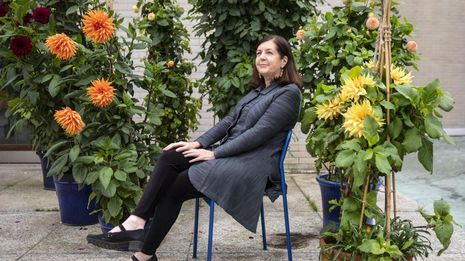Dorothy Byrne is right: We should be discussing fertility
A Murray Edwards student discusses the benefits of holding candid conversations around fertility, regardless of gender, sex, or reproductive plans

My college has made headlines lately because its president used the F-word: fertility. Last term, a media storm blew up over rumours that she planned to introduce a series of fertility seminars in college, and recently, there has been another wave of fury over a speaker who dared commit a modern heresy: she said she was pregnant.
Students have been taken aback by their president discussing these themes, and their shock speaks to a wider problem at Cambridge: our lives are not purely defined by careers and degrees.
“As a woman, particularly in my male-dominated department, it sometimes feels almost anti-feminist to include having a family as one of my future ambitions”
Many students felt that it was not the place of a president of an academic institution to discuss personal matters such as fertility. However, in an institution such as Cambridge, where there is often intense focus on measuring success through academic progression and high-flying careers, Dorothy Byrne’s recognition of other aspects to her students’ futures holds a certain significance. As a woman, particularly in my male-dominated department, it sometimes feels almost anti-feminist to include having a family as one of my future ambitions. I’m supposed to want to smash the patriarchy and be a woman in STEM, not want to have babies. The two notions are sometimes presented as incompatible. While I am aware that many women worldwide are told that their roles lie solely in motherhood, and this has certainly been the case historically, it is usually the opposite for many female students here. The notion of motherhood can feel taboo.
My college president’s desire to open the conversation around fertility struck me as a significant recognition of the multiple ambitions that students can have in life, not all based around careers or academia. And realistically, colleges do and should have a pastoral role and already provide workshops on a variety of issues not related to our degrees, such as diversity workshops.
It is true that there are students at Murray Edwards who have no intention of having children. However, the majority of students will start families at some point in their lives. Shutting down a discussion because it isn’t relevant to every student sets a dangerous precedent. Every college offers consent workshops, despite the numerous students who choose not to be sexually active for a range of reasons, be they religious or otherwise. We appreciate that while an issue doesn’t relate to everyone, it’s important to provide education for those who want it, and simply discussing a topic that is relevant to a significant portion of students should not mean alienating those to whom it is not.
“There is a marked gap in our sexual education when it comes to issues of reproductive health”
Dorothy Byrne was criticised for the manner in which these seminars could potentially cause feelings of exclusion within college among Murray Edwards students who do not identify as women, or even those who don’t want to have children in the traditional way. It isn’t easy to study at a college casually referred to as ‘all girls’ when someone doesn’t identify as such, and the thought of a conversation that could be exclusively directed at heterosexual cisgender women within Murray Edwards is understandably upsetting. However, rather than shut down the conversation, a focus on ensuring that students of all genders and sexualities are well informed about their reproductive health would be far more beneficial.
I personally have very little awareness of reproductive methods outside of the traditional matter taught in GCSE Biology, and I suspect that many students have had similar experiences. In our adolescent years and early twenties we are continuously forming our identities, and with that comes a stronger idea of the types of families we’d like to have and the lifestyles we’d like to lead. Our sexual health education broadens during this period, and everything from sexuality and gender to contraception and consent is taught in more depth. Yet there is a marked gap in our sexual education when it comes to issues of reproductive health. I know very little about topics such as IVF, egg freezing, or biological clocks. I firmly believe that access to such knowledge would enable students to make more informed decisions.
The discussion around fertility does not have to be moralising or alienating. Having children is something that most of us will do and will want to do in the future. Rather than censor the conversation, let’s expand it and appreciate that having strong knowledge now can help students plan for the future. The conversation may start at Murray Edwards, but while we’re at it, let’s spread it to the boys as well.
 Comment / Plastic pubs: the problem with Cambridge alehouses 5 January 2026
Comment / Plastic pubs: the problem with Cambridge alehouses 5 January 2026 News / Cambridge businesses concerned infrastructure delays will hurt growth5 January 2026
News / Cambridge businesses concerned infrastructure delays will hurt growth5 January 2026 News / New movement ‘Cambridge is Chopped’ launched to fight against hate crime7 January 2026
News / New movement ‘Cambridge is Chopped’ launched to fight against hate crime7 January 2026 News / Uni-linked firms rank among Cambridgeshire’s largest7 January 2026
News / Uni-linked firms rank among Cambridgeshire’s largest7 January 2026 News / AstraZeneca sues for £32 million over faulty construction at Cambridge Campus31 December 2025
News / AstraZeneca sues for £32 million over faulty construction at Cambridge Campus31 December 2025









